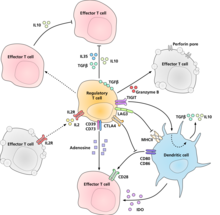Metronomic therapy
Metronomic therapy is a new type of chemotherapy in which anti-cancer drugs are administered in a lower dose than the maximum tolerated dose repetitively over a long period to treat cancers with fewer side effects.
[1] Metronomic therapy is also cost-effective as a lower dose is used compared to conventional chemotherapy.
[5] Another target of metronomic therapy is the bone marrow-derived circulating endothelial progenitor cells (CEPs), which are involved in tumor angiogenesis.
[9] The number of CD4+ CD25+ FOXP3+ regulatory T cells (Tregs) was found to increase in various types of tumors, suppressing both specific and innate immune responses.
[10][11] This selective inhibition is not observed in conventional chemotherapy which reduces the number of all lymphocyte subsets.
In addition, some chemotherapeutic agents including cyclophosphamide, methotrexate, vinblastine, paclitaxel and etoposide can promote maturation and antigen-presenting ability of dendritic cells, which in turn facilitate the T-cell mediated immune response against tumors.
[14] In fact, a recent study presented at American Association for Cancer Research (AACR) congress in 2017 announced the effect of metronomic regimens.
Although metastatic or recurrent lung cancer is difficult to be completely cured with modern medical technology, metronomic therapy is feasible as a palliative therapy by reducing tumor burden and improving patients' quality of life.
Despite the encouraging results, there are not many clinical trials using metronomic therapy for ovarian cancer.
Due to few clinical trials and lack of information about the applications, it is still risky and questionable to substitute conventional therapy used in treatment of ovarian cancer.
[25][26] Therefore, lowering the expense of paediatric cancers is a key to improve the quality of life worldwide.
[4] The studies are heterogeneous in terms of patient selection, chemotherapeutic agents, dosage and dosing interval.
Multiple reviews pointed out that further studies should be carried out to determine the most effective drugs, dosage and dosing interval according to tumor and patient characteristics.
Blood biomarkers related to angiogenesis, such as VEGF, TSP-1, circulating endothelial cells (CECs) and CEPs, have been tested.
It assesses the tumor vascularity by measuring blood flow, fractional intravascular volume and other related parameters.

